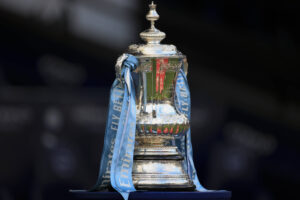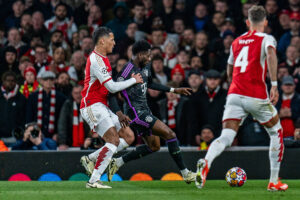Arsenal currently sit fourth in the Premier League, eight points off the top of the table. Their title chances can’t quite be written off entirely, but they will have to produce a truly magnificent run of form between now and the end of the season—and rely on Chelsea dropping several points in the process—to stand any chance of winning the league.
Nevertheless, they are still in two other competitions: the FA Cup, which has brought them some joy in recent years, and the Champions League, which has not. Historically, the Gunners have performed far below what they are capable of achieving in Europe, considering the teams and players they’ve had, and have failed to get past the Last 16 of the Champions League since 2010. Arsène Wenger is often criticised for his failure to win the competition, but it could easily have been very different (and still can).
In his defence, Arsenal have not much luck of the draw in recent years, with the exception of their Last 16 tie against Monaco in 2014-15, which ended in a devastating defeat on away goals. Since they last reached the quarter-final of the competition, they have drawn Barcelona (twice) and Bayern Munich after finishing second in the group stage, as well as the infamous Monaco tie, and Milan—one of the strongest opponents they could have drawn—and most recently Bayern again after topping their group. Regardless, it is still the case that the Gunners have underperformed in most of these ties.
The biggest problem—one which has plagued Wenger’s sides for decades—has been getting to grips with the away goals rule. They crashed out on away goals in both the 2012-13 and 2014-15 seasons and almost always made life far too difficult for themselves when they played the first leg at home by conceding needless late goals.
In 2012-13, having gone 2-0 down at home to Bayern, Lukas Podolski brought the score back to 2-1. Instead of cutting their losses and accepting the one-goal deficit, or at the very least being cautious in pursuing an equaliser, Arsenal threw too many men forward and conceded a third away goal. They would eventually win 2-0 in the away leg, but still lost the tie because of the third goal they conceded at home.
The next season, they played Bayern again and, following a missed penalty from Mesut Özil and a red card for Wojciech Szczesny, went 1-0 down. They were dominated in the second half, but managed to keep the deficit at one goal until, after winning a free-kick near the end of the match, they gave the ball away and conceded a second goal which made their task seem impossible. It’s not possible to say whether this would have made a difference in the second leg, but it’s safe to say that coming back from 1-0 down would have seemed much easier than overturning a 2-0 defeat.
The following year, a plethora of missed chances, most infamously from Olivier Giroud, meant that the Gunners were 2-0 down to Monaco. An injury time goal from Alex Oxlade-Chamberlain meant that in the away leg they would have to win by two goals to go through, but they were more than capable of this. Unfortunately, they somehow found away to concede another goal and lose the match 3-1. Just like in 2013, they won 2-0 away from home and agonisingly went out on away goals. That silly third goal probably made all the difference.
Even though they were comfortably outplayed over the two legs by Barcelona last season, Arsenal conceded another silly late goal in the home leg to double the opposition team’s lead. This is a bad habit which they need to get out of in future competitions.
This time around, they will play Bayern Munich again, but the situation is a bit different compared to previous seasons. The Champions League betting does not favour the Gunners once again, but they must understand that they can do something special in Europe this season if they change their approach, and that the competition itself is not as hard to win as they think.
After the group stages, the Champions League is a knockout competition. This means that upsets can happen and it’s far easier for a team to do well despite not being the strongest unit in the competition than it is over a full league season; take Chelsea’s triumph in 2012 as one of the most recent examples. It is very hard to beat a team who are better than you over two legs, but it is possible and has happened many times in the past.
For Arsenal to be able to do this, they will have to change their approach to the more difficult matches, perhaps taking inspiration from their brilliant run to the final in 2006. In that campaign, they came up against Juventus and Real Madrid, both of whom were probably stronger sides considering the Gunners’ defensive injury woes at the time, which led to them playing a back four of Emmanuel Eboué, Kolo Touré, Philippe Senderos and Mathieu Flamini in the Bernabéu.
Despite this, they emerged victorious in both ties, not even conceding in all four matches. They would go onto the final, failing to concede for 995 minutes, before cruelly losing out to Barcelona after Jens Lehmann was sent off.
In the home leg against Juventus, Arsenal were the better side due in no small part to a sensational performance from a young Cesc Fabregas, but the main reason they nearly won the competition that year was because of their defensive performances. They did not let in a goal for nearly 1000 minutes, even their defence was ripped apart by injury for most of the season and, obviously, could not be beaten.
The current side needs to take inspiration from this and some of Chelsea’s performances over the years. The Blues have consistently been able to compete with and beat better sides than them by defending heroically and fighting for victory. It may not have been pretty at times, but in both cases it got results.
Bayern will be there for the taking this season. They are an excellent side, but in their first season under Carlo Ancelotti, they have shown weaknesses as they get used to the new manager. Arsenal must exploit any problems they have, whilst remaining careful cautious in both legs.
Wenger’s side have the advantage of playing the first leg away from home. At the Allianz Arena, they should “go for it” a bit more as they look for what would be an important away goal, but if things start to go wrong, they can’t afford to collapse like they did in the 5-1 defeat in last season’s group stage. When going forward, they should always keep at least three defenders back—and maybe force one of the midfielders not to push forward too much—in order to avoid giving away any cheap goals on the counter attack. A 1-1 draw or possibly even a 2-1 defeat can be considered a decent result in this match.
At home, the main priority for at least the first 45 minutes should be not to concede, even if they are trailing by one goal. A more counter-attacking style of play will put their opponents under pressure and make them more wary of committing men forward. If in the second half the tie is level, Arsenal are ahead either in terms of the scoreline or on away goals, or Arsenal need just one goal to go through, Bayern will start to feel the pressure.
Sometimes in the Champions League, luck can be on your side, be it in terms of the teams you draw or what happens in the matches themselves. Arsenal haven’t had much of that in recent years, but they can’t afford to feel like victims because of it. Whatever cards they’ve been dealt in this competition, they certainly haven’t done the best with them.
This year should be treated as an opportunity to put to bed the disappointments suffered in past years in Europe, as should they get past the Last 16 and go on a run, it could well be a turning point in the club’s history. Another disappointment, on the other hand, could see this cycle of misery keep going for a long time yet.
Main Photo






